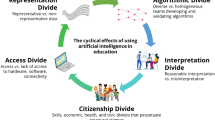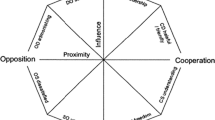Abstract
This article reports findings from a two-year independent evaluation of the Little Scientists program; a program providing science, technology, engineering, and mathematics (STEM) professional development for early childhood educators across Australia. This article reports on the qualitative data gathered with educators to illustrate early childhood STEM education in practice. Data are analysed using an established framework for effective STEM education in order to demonstrate how the Little Scientists program is supporting best-practice in early childhood STEM education. Findings suggest that educators’ confidence in teaching STEM has increased, and participants are more aware of children’s skills and knowledge in STEM. Educators are fostering communities of STEM inquiry where children and educators learn and research together, with space for children’s self-directed and play-based explorations. It appears that participation in Little Scientists has afforded a range of benefits for participants and, by extension through their practices, for the children with whom they work.

Similar content being viewed by others
Notes
The Little Scientists Australia ‘Early STEM Awards’ were awarded to winners from each state and territory, with an overall national winner. The awards celebrated commitment and dedication to early STEM education and inquiry-based learning.
References
Aldemir, J., & Kermani, H. (2017). Integrated STEM curriculum: Improving educational outcomes for Head Start children. Early Child Development & Care,187(11), 1694–1706. https://doi.org/10.1080/03004430.2016.1185102.
Alexander, C., Knezek, G., Christensen, R., Tyler-Wood, T., & Bull, G. (2014). The impact of project-based learning on pre-service teachers’ technology attitudes and skills. Journal of Computers in Mathematics & Science Teaching,33(3), 257–282.
Atiles, J. T., Jones, J. L., & Anderson, J. A. (2013). More than a read-aloud: Preparing and inspiring early childhood teachers to develop our future scientists. Teacher Education and Practice,26(2), 285–299.
Bers, M. U., Seddighin, S., & Sullivan, A. (2013). Ready for robotics: Bringing together the T and E of STEM in early childhood teacher education. Journal of Technology and Teacher Education,21(3), 355–377.
Boyatzis, R. E. (1998). Transforming qualitative information: Thematic analysis and code development. Thousand Oaks, CA: SAGE Publications.
Bybee, R. W. (2013). The case for STEM education: Challenges and opportunities. Arlington, VA: NSTA Press.
Campbell, C., Speldewinde, C., Howitt, C., & MacDonald, A. (2018). STEM practice in the early years. Creative Education,9(1), 11–25. https://doi.org/10.4236/ce.2018.91002.
Cohrssen, C., & Page, J. (2016). Articulating a rights-based argument for mathematics teaching and learning in early childhood education. Australasian Journal of Early Childhood,41(3), 104–108.
Eng Tek, O. N. G., Ayob, A., Ibrahim, M. N., Adnan, M., Shariff, J., & Ishak, N. (2016). The effectiveness of an in-service training of early childhood teachers on STEM integration through Project-Based Inquiry Learning (PIL). Journal of Turkish Science Education (TUSED),13, 44–58. https://doi.org/10.12973/tused.10170a.
Fleer, M., March, S., & Gunstone, D. (2006). Investigations into the engagement of preschool and primary aged children in science, engineering and technology. Report by Monash University, Department of Science and Training.
Gee, K. A., & Wong, K. K. (2012). A cross national examination of inquiry and its relationship to student performance in science: Evidence from the Program for International Student Assessment (PISA) 2006. International Journal of Educational Research,53, 303–318.
Hedlin, M., & Gunnarsson, G. (2014). Preschool student teachers, technology, and gender: Positive expectations despite mixed experiences from their own school days. Early Child Development and Care,184(12), 1948–1959.
Hefty, L. J. (2015). STEM gives meaning to mathematics. Teaching Children Mathematics,21(7), 422–429.
Hunting, R., Mousley, J., & Perry, B. (2012). A study of rural preschool practitioners’ views on young children’s mathematical thinking. Mathematics Education Research Journal,24, 39–57.
Johnston, J. (2011). The impact of home and school on early years scientific development. Education in Science,245, 30–31.
Kelley, T. R., Brenner, D. C., & Pieper, J. T. (2010). Two approaches to engineering design: Observations in STEM education. Journal of STEM Teacher Education,47(2), 5–40.
Lai Poh, T., Causo, A., Pei-Wen, T., I-Ming, C., & Yeo, S. H. (2016). A review on the use of robots in education and young children. Journal of Educational Technology and Society,19(2), 148–163.
MacLeod, K. (2013). Physics education and STSE: Perspectives from the literature. European Journal of Physics Education,4(4), 1–12.
McDonald, C. V. (2016). STEM education: A review of the contribution of the disciplines of Science, Technology. Engineering and Mathematics. Science Education International,27(4), 530–569.
McPhan, G., Morony, W., Pegg, J., Cooksey, R., & Lynch, T. (2008). Maths? Why not?. Canberra: Department of Education, Employment and Workplace Relations.
Murphy, S., MacDonald, A., Danaia, & L., Wang, C. (2018). An analysis of Australian STEM education strategies. Policy Futures in Education. https://doi.org/10.1177/1478210318774190.
Panizzon, D., & Westwell, M. (2009). Engaging students in STEM-related subjects. What does the research evidence say? Retrieved February 8, 2017, from http://www.flinders.edu.au/science_engineering/science-21-files/briefings/Engaging%20students.pdf.
Park, M.-H., Dimitrov, D. M., Patterson, L. G., & Park, D.-Y. (2017). Early childhood teachers’ beliefs about readiness for teaching science, technology, engineering, and mathematics. Journal of Early Childhood Research,15(3), 275–291. https://doi.org/10.1177/1476718X15614040.
Patrick, H., Mantzicopoulos, P., & Samarapungavan, A. (2009). Motivation for learning science in Kindergarten: Is there a gender gap and does integrated inquiry and literacy instruction make a difference. Journal of Research in Science Teaching,46(2), 166–191.
Perry, B., & MacDonald, A. (2015). Educators’ expectations and aspirations around young children’s mathematical knowledge. Professional Development in Education,41(2), 366–381.
Prinsley, R., & Baranyai, K. (2015). STEM skills in the workforce. Retrieved February 8, 2017, from http://www.chiefscientist.gov.au/wp-content/uploads/OPS09_02Mar2015_Web.pdf.
Redmond, A., Thomas, J., High, K., Scott, M., Jordan, P., & Dockers, J. (2011). Enriching science and math through engineering. School Science and Mathematics,111(8), 399–408.
Reimers, J. E., Farmer, C. L., & Klein-Gardner, S. S. (2015). An introduction to the standards for preparation and professional development for teachers of engineering. Journal of Pre-College Engineering Education Research,5(1), 40–60.
Starkey, L. (2012). Teaching and learning in the digital age. New York: Taylor and Francis.
Watts, T. W., Duncan, G. J., Siegler, R. S., & Davis-Kean, P. E. (2014). What’s past is prologue: Relations between early mathematics knowledge and high school achievement. Educational Researcher,43(7), 352–360.
Acknowledgements
This work was supported by an external competitive grant provided by FROEBEL Australia Limited.
Author information
Authors and Affiliations
Corresponding author
Additional information
Publisher's Note
Springer Nature remains neutral with regard to jurisdictional claims in published maps and institutional affiliations.
Rights and permissions
About this article
Cite this article
MacDonald, A., Huser, C., Sikder, S. et al. Effective Early Childhood STEM Education: Findings from the Little Scientists Evaluation. Early Childhood Educ J 48, 353–363 (2020). https://doi.org/10.1007/s10643-019-01004-9
Published:
Issue Date:
DOI: https://doi.org/10.1007/s10643-019-01004-9




